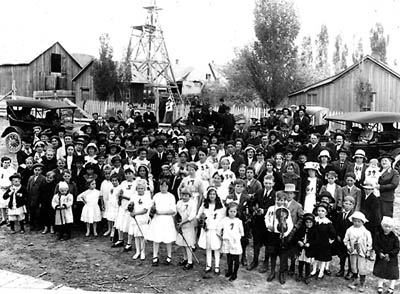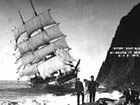The day the drinks were on Governor Oswald West
Legendary governor, a staunch prohibitionist, had to buy a round for the house when he dropped by the town marshal's saloon in the now-ghost town of Harney; a few years later, he pardoned the marshal, who'd been busted for gunfighting.

Members of the Sagebrush Symphony Orchestra pose with family and
friends in Harney City ― including, most likely, all the residents of Harney
City and their automobiles ― following a performance on the Fourth of
July about 1915. That was the year the group toured Eastern Oregon for
the Redpath Chautauqua. The Sagebrush Symphony Orchestra, based in
Burns, was the project of violinist Mary Dodge, who later helped found
what became the Portland Youth Philharmonic. (Image: Harney County
Public Library) [Larger image: 1200 x 881 px]
By Finn J.D. John — July 31, 2011
A dozen or so miles out of Burns, just off Highway 20, there's a spot along Rattlesnake Creek where, if you know what you're looking for, you might find the last remnants of one of Oregon's most-gone ghost towns.
This is (was) Harney City, formerly the seat of Harney County. Today it's hard to find; it's been a ghost town since the 1930s, when the last of the high-desert homesteaders gave up and moved away. But in 1912, when Governor Oswald West dropped in to make a stump speech, it was a thriving community of 100 souls, with a couple sawmills, a stockyard full of sheep, a Presbyterian church, a general store and a saloon.
West surely wasn't the only Western-state governor to have made a stump speech in a soon-to-be ghost town, but he may have been the only one to make a speech in a town so remote and tiny. The other funny thing about this speech is that just before making it, West ― the governor who more or less sponsored Prohibition in Oregon ― bought drinks for everyone in the saloon.
Here's the story:
Stumping in the sticks
West, in his second year as Oregon's governor, was on his way to a conference of Western governors in Boise. Riding out of Burns, he headed for Harney City, where he hoped to make an afternoon speech.
When he got there, he headed straight for the general store and talked to proprietor Fred Haines. Fred was a staunch Republican, but graciously refrained from throwing the Democratic governor off the premises and told him town meetings were usually held in the church. Prompted for more information, he allowed that the town marshal was the man to talk to about making such an arrangement. Prompted again ― Fred clearly was not bending over backwards to be helpful here ― he told West the town marshal would be found across the street in the local saloon, which he owned.
(This wasn't as unusual as it sounds to the modern ear. The town marshal of Portland in the 1870s, and later its first police chief, was a fellow named James Lappeus, owner of a famous Stumptown saloon called the Oro Fino.)
West went to the saloon and found the joint packed with about 40 percent of the population of Harney City ― sheepherders, packers and mill workers eating and drinking, with the town marshal pulling beers and filling orders for food at the bar. It was almost certainly lunchtime, although West didn't say specifically what time it was.
West introduced himself and asked about using the church. The marshal was happy to oblige ― although his cooperation may have had to do with West's next move:
A teetotaler rings the bar bell
“Although a pronounced Prohibitionist, I didn't have the crust to ask such a favor without setting up drinks for the crowd,” West remembered later, in 1949. “After the ceremonies at the bar, the marshal said, 'All of you get the hell out of here. I'm going to lock up. We are going down to hear West make a speech.”
Across the street traipsed the happy lunchtime crowd, followed by a number of other residents attracted by the steeple bell, which the marshal was ringing. The guv delivered a speech, shook some hands and headed out toward Vale and points east.
An old friend visits the governor ... in handcuffs
A year or two later, West was in his office in Salem. Things were going well; the Oregon Beach Highway Law had passed, and the wheels were already turning to outlaw the sale of drinking alcohol in Oregon. He'd gained some nationwide notoriety for the incident at Copperfield, where he'd declared martial law and sent his secretary at the head of a detachment of National Guard troops to padlock every saloon and gambling hall in the place after the county sheriff's response to complaints of corruption and illegal activity there weren't vigorous enough for him.
And that's about when the Harney County Sheriff stopped in to let the governor know he was bringing an old friend to Salem ― to the Oregon State Penitentiary.
Wild West-style shootout
It seemed the Harney City town marshal/saloon keeper had gotten into a frank exchange of views with a couple of local competitors ― the town of Harney City apparently was not big enough for more than one saloon. The antagonists had gone for pistols, and the town marshal had ended up plugging one of the other two in the arm. Tried and convicted, he was now on his way to Salem to serve time for this felony.
“Well, when you bring him down, drop in here on the way to the Pen,” West replied.
When the saloon keeper/town marshal/convicted felon arrived at the governor's office, he got a surprise that may not have been so surprising:
“I had a pardon prepared for my Harney friend, and as I handed it to him I said, 'Brother, go thy way and shoot no more,” West recalled.
I haven't been able to learn the marshal's name, although somewhere in the state archives there is surely a copy of his pardon. West discreetly leaves it out of his account. But within a year or two, the saloon he was fighting over would turn into either a restaurant or a speakeasy, as Oregon's prohibition law kicked in. Not many years after that, the entire town would be left to the jackrabbits.
(Sources: West, Oswald. “Reminiscences and Anecdotes: Political History,” Oregon Historical Quarterly, v. 50, December 1949; Friedman, Ralph. The Other Side of Oregon. Caldwell, Idaho: Caxton, 1993; Brimlow, George Francis. Harney County and its Range Land. Portland: Binford, 1951)
TAGS: #PLACES: #ghostTown #nowGone :: #PEOPLE: #doers #progressives #politicians #rascals :: # #cultureClash #irony #whodaThunk :: LOC: #harney :: #139
























